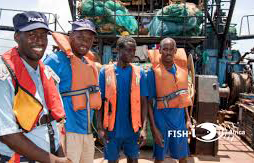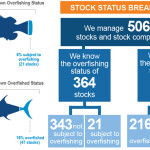 Seafood Champion Award for Innovation: FISH-i Africa
Seafood Champion Award for Innovation: FISH-i Africa
By Jason Holland
Conducting illegal, unreported and unregulated fishing (IUU) practices in African waters has become a much more difficult undertaking since the launch of the FISH-i Africa partnership, but there is still a lot more that can be done to support these countries and their fisheries, according to Per Erik Bergh, a coordinator with the Stop Illegal Fishing advocacy organization, based in Botswana.
Collecting this year’s Seafood Champion Award for Innovation at the 2017 SeaWeb Seafood Summit in Seattle, FISH-i Africa unites the eight East African coastal countries of Comoros, Kenya, Madagascar, Mauritius, Mozambique, Seychelles, Somalia, and Tanzania in a pioneering regional task force to combat large-scale illegal fishing in the Western Indian Ocean through regional cooperation.
When it started out in 2012, task force members shared information on the vessels that were licensed to fish in their respective waters; then, using satellite tracking, they established which vessels were actually fishing and identified the non-licensed vessels. The task force then took collective enforcement action based on the trust that had been established across the network.
“We had some early wins with this approach,” Bergh told SeafoodSource. “But our investigations uncovered more systematic violations, illegalities and crimes taking place than any of us had anticipated. We continually have to innovate and adapt our approach. So, for example, the extent of vessel identity fraud uncovered by our investigations has been truly shocking. Many of our investigations involve vessels sharing identities, simply painting over names and forging documents as in the case of the ‘NAHAM-4,’ a name and identity used by at least four separate fishing vessels.”
This has led to the development of the FISH-i vessel database, VISIBLE, which will launch at the end of 2017.
“It is a simple system, but it will help put the power back in the hands of enforcement officials,” Bergh said.
Berge said receiving a Seafood Champion Award meant a great deal to his organization.
“To be recognized by a global event like the Seafood Champion Awards is very important for the members of FISH-I,” he said. “This award is recognition for all the task force members who have been prepared to do things differently, to work together with their neighbors and to really take on the challenge of stopping illegal fishing. It will motivate us to continue to progress and grow the cooperation.”
The award’s significance is heightened by the countries that are involved in the initiative, who like many African coastal states, struggle to deploy sufficient resources. Additionally, the social agenda in Africa has historically put resource management low on the priority list, meaning that oceans and fisheries have only been considered in terms of what can be seen and looked after from the shoreline, explained Bergh.
“With the increased globalization of the fishing industry in the last 20 years, fleet activities have changed tremendously but these coastal states were still under-resourced and unaware of the massive activities taking place in their EEZ (exclusive economic zone),” he said.“Before FISH-i, these countries would very much work on their own and there would be little dialogue between them. What we have seen in the years since the launch of the network is the establishment of a communication platform that, for example, makes it possible for all countries to instantly consult one another, providing vessel movements and building cooperation. This means there is a much greater awareness about the movement of fishing fleets and what is happening out on the water. This makes it possible for countries to deal with activities and protect their more distant fish stocks, not least curbing illegal fishing and associated crimes.”
While cooperation is not common among coastal states that compete for resources, the alliance is showing that regional collaboration and intelligence sharing is an effective, low-cost solution in the war on IUU as it provides the viable means to stop illegal catches reaching market, thus preventing criminal fishers from pursuing what has been a very lucrative business unimpeded. Its success is evidenced by a long string of investigations, settlements and prosecutions as well as improved licensing and flagging checks, which are all contributing to a more compliant, sustainable fisheries sector in the Western Indian Ocean.
An example of a specific action taken by FISH-i Africa was with the South Korean purse seiner, the “F/V Premier,” which fled Liberia to avoid a USD 2 million (EUR 1.8 million) fine for fishing illegally. Following detection in the FISH-i region, all members denied it access to fishing licenses and ports. This increased costs, created by negative media, resulted in a reduced price for the fish and eventually forced the owner to pay the fine.
“This was the first case that FISH-i worked on together, so was very aptly named. We wouldn’t have been able to secure the fine if industry players hadn’t intervened,” said Bergh.
FISH-i has spearheaded more than 30 investigations to date, resulting in successful fines and prosecutions that provide an increasingly strong deterrent to illegal activity while also promoting legitimate operators. It also continues to compile valuable evidence about how illegal operators work – shining a light on practices such as dual identity, fraudulent documents, corruption and hiding behind weak flag states.
“A recent high-profile investigation into the ‘GREKO 1’ highlights many of these elements. Caught fishing illegally in the Somali EEZ, the vessel absconded from authorities in Mogadishu, but through cooperative action with neighboring Kenya a fine was settled and paid,” according to FISH-i. “The investigation found issues around the true identity of the vessel and has led to investigations into potential fraud, as the owner had received payment under an E.U. scrappage scheme for both the ‘GREKO 1’ and her sister ship, ‘GREKO 2.’”
FISH-i has also turned to the media to bring results when systemic corruption or legal systems have blocked effective action against illegal operators.
“The exposure and awareness created around specific cases has been successful in reaching settlement of fines, but also creates a powerful deterrence to other operators. The transparency that has been brought to the region makes it a lot more difficult for illegal operators to continue with their activities. They are being detected much more quickly and exposed,” Bergh said. “The tide is definitely turning thanks to the combination of increased cooperation and knowledge, as well as the stronger focus on resource management, which is much higher on today’s political agenda than it was in the past.
With FISH-i Africa, the timing was right because of the problems that the region had experienced with illegal fishing, Bergh said.
“The awareness is greater today, but some of us have been working with these countries for 20 years or more. We know the people and the countries well and building trust is very important to have the ability to introduce such an initiative.Over the last decade, the awareness has grown tremendously. There is a much better understanding today of all the issues and the need to manage these fisheries properly,” he said.
Looking ahead, management departments in East Africa remain heavily under-resourced, while some big fishing fleets continue to fish in the Western Indian Ocean, leaving huge expanses of ocean unmonitored, Bergh said. For the moment, though, he believes it is important to continue to focus on the ports and what is being landed and traded and then try to build a clearer picture of what is moving in the ocean.
“It’s about resources – not least financial resources – because patrol vessels and planes are extremely expensive platforms to operate,” he said. “These countries need to think differently because that kind of money isn’t there.”
FISH-i is therefore looking to expand the model to grow greater cooperation with other flag-, port-, and market-states around the world. At the same time, other countries and regions are taking note of its success. For example, the West Africa Task Force, based on the model, was formed in 2015 by six nations seeking to combat illegal fishing.
Bergh is also keen to build on FISH-i’s work that has looked at illegal fishing’s so-called “associated crimes,” including the prevalent practices among illegal operators of human trafficking and human rights abuses – issues that were not really on the agenda when FISH-i started five years go. He stressed that developing countries will always be the most susceptible to such problems, but that the task force is now well placed to act upon them.





